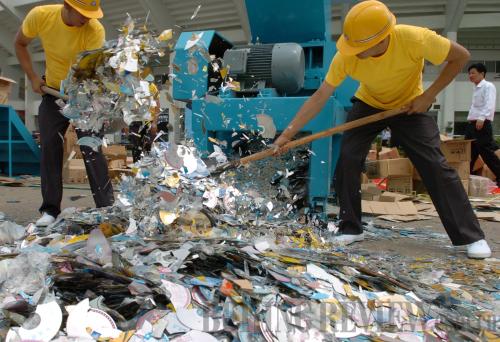|
 |
|
Guangzhou is destroying the pirated CDs (XINHUA) |
Combating IPR Infringements
China's Ministry of Public Security launched a new round of crackdown on intellectual property right infringements starting from November 2010 to March 2011.
According to Liu Jinguo, Vice Minister of Public Security, the campaign will focus on combating against infringement of copyrights, trademarks and the patents. Meanwhile, they will fight against the production and sale of pirated books, videos, software and the counterfeit of medicine, food, agricultural products and national famous brands.
Besides the IPR-related crime crackdown, China will step up the IPR protection efforts by strengthening its law enforcement and punishment measures, as well as its legal system building.
Chloroform Anti-dumping Tax
China will continue to impose anti-dumping tax on chloroform imported from the European Union, the United States and South Korea, starting from November 30, 2010 and lasting four years, according to an announcement issued by the Ministry of Commerce (MOFCOM) on November 29.
On November 30, 2004, MOFCOM announced a five-year-long anti-dumping tax on chloroform from the EU, the United States, South Korea and India after it found chloroform purchased from these places had caused essential damage to domestic chloroform industries. On November 29, 2009, the day before the anti-dumping measures were due to expire, MOFCOM received applications for review of the anti-dumping measures from two chemical companies from Shandong and Zhejiang provinces representing the domestic chloroform industry.
On November 29, the one-year-long review finally decided that the anti-dumping tax would continue, for the same reasons given earlier.
Chloroform is widely used in medical and chemical industries. It is a main ingredient to fluorine refrigerant in refrigerators.
Energy Efficient Standards
High-energy-use panel televisions and microwave ovens were eliminated after new energy efficiency standards were implemented since December 1, 2010. Flat panel television sets which fail to reach grade three and microwave oven products unable to reach grade 5 standard will be taken off the market according to a statement jointly issued by the National Development and Reform Commission and the General Administration of Quality Supervision, Inspection and Quarantine.
"Minimum Allowable Values of Energy Efficiency and Energy Efficiency Grades for Flat Panel Televisions and Microwave Oven" is a mandatory national standard. According to a previous state inspection, about 14.5 percent of flat panel television and 10-15 percent of microwave ovens on the market are substandard and will be removed when the new measure is implemented.
Qualified products will carry labels indicating their grade of energy efficiency to facilitate consumers purchase choice.
New Taxes on Foreign Companies
China began to levy city maintenance and construction tax as well as education surcharge on all foreign enterprises and individuals investing in China on December 1, 2010, ending 20-year-long "super-national treatment for foreign investment."
According to the statement issued by the State Council, the move aims to create a more fair investment market for both domestic and foreign companies. New taxes imposed on foreign companies mark a further unified national tax system. On January 1, 2008, in response to mounting calls from domestic companies for equal competition, China unified the corporate income tax rate on domestic and foreign firms at 25 percent. Before that foreign companies enjoyed a 15 percent preferential rate while their Chinese counterparts were levied at 33 percent.
Environmental Tax Is Imminent
China will soon be levying environmental tax on enterprises discharging pollutants, according to reports from Economic Information Daily. Experts told the newspaper that the proposal to levy environmental tax has been submitted to the State Council after being approved by the Ministry of Finance, State Administration of Taxation and the Ministry of Environmental Protection. It's expected to be implemented in 2011 at the earliest.
According to the proposal, sulfur dioxide and wastewater will be the first to be taxed with collections made on a quantity base. China has been collecting pollution discharge fees on enterprises as a way to protect the environment.
As the government gradually expands the environmental tax scope and lifts the tax rate, more enterprises will be affected and see their production cost rise. |